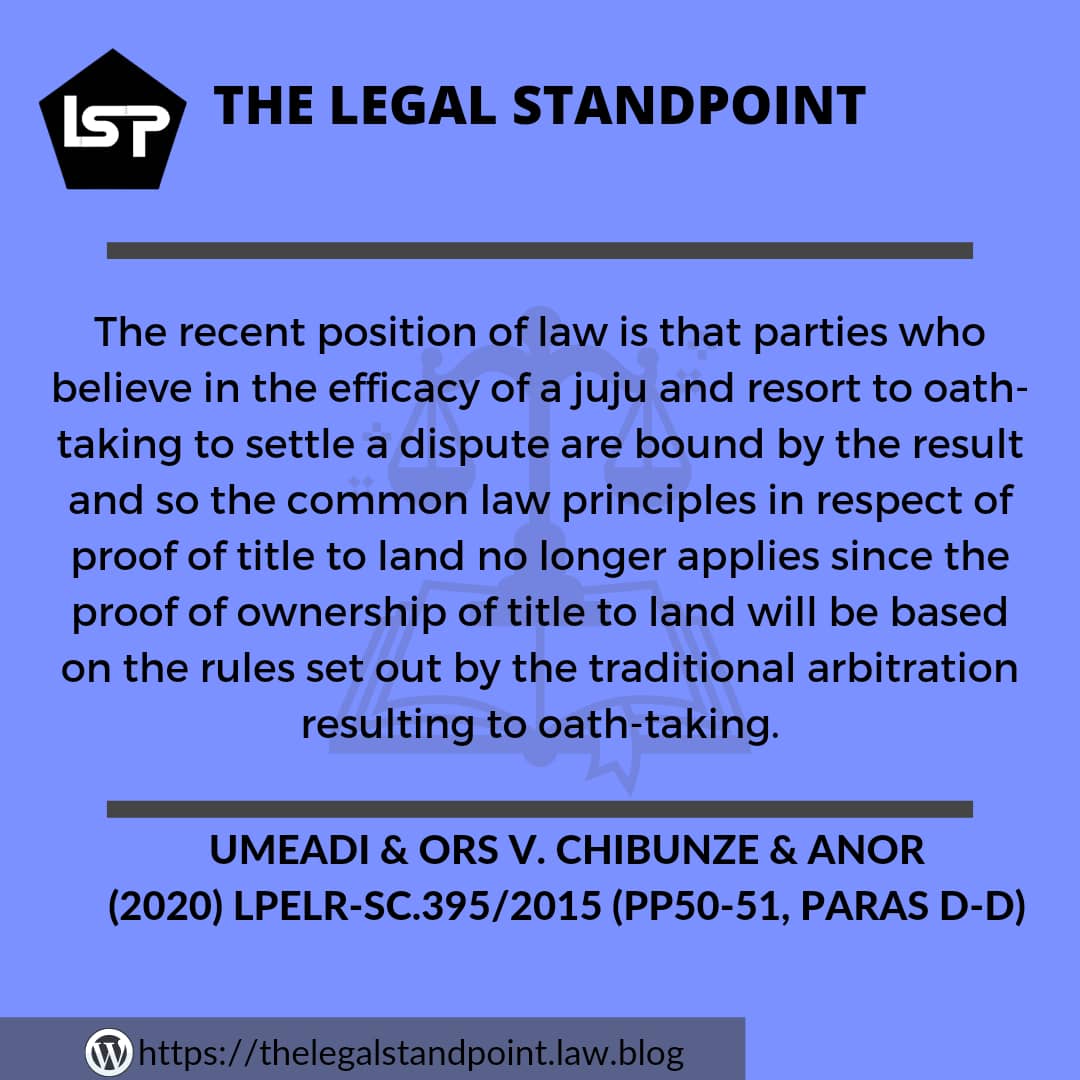
From time immemorial, dispute is one of the things that has permeated human existence. They are bound to ‘happen’ due to our daily interactions with natural and juristic persons. In law, these disputes could be a breach to perform one’s obligation in contract to the assertion of one’s right in Human Rights, or even inheritance under Succession, etc.
In land matters, most disputes arise to determine the person who possesses the valid ownership of a land. There exist several ways of settling this dispute and Oath-taking under traditional customary arbitration is one of the ways employed by people, especially in the Eastern part of the country.
Oath-taking is a valid process under customary law arbitration and it is one of the methods known to customary law for establishing the truth of a matter. Once it is established that the parties to any case had earlier voluntarily submitted their dispute to traditional arbitration and had accepted its verdict and agreed to be bound by it, provided it is not repugnant to natural justice, equity and good conscience, the courts have always refused to let any parties back out of the decision. See Onyenge &Ors V. Ebere & Ors (2004) LPELR-SC.117/2000.
THE FACTS OF THE CASE
The Respondents, descendants of one Chibunze, are a lineage of Umu-Ofuonye larger family. The Appellants are also members of the said Umu-Ofuonye family.
In 1940, a dispute over a land arose between the Umu-Ofuonye family and Umu-Ogbocha family. The elders intervened and successfully arbitrated in the dispute. The parties submitted to the arbitration and the oath-taking procedure was adopted. The Umu-Ogbocha agreed that if the Umu-Ofuonye family successfully took the traditional oath the land became theirs. The Umu-Ogbocha placed juju on the land. Within the Umu-Ofuonye family, only Chibunze agreed to take the oath as others were afraid.
He eventually took the oath and survived. Thereafter the said Chibunze and his descendants had laid claim to the ownership of the Isi-Ekpe land to the exclusion of other members of the Umu-Ofuonye family (represented by the Appellants herein) who insist that the land remained the joint property of the entire Umu-Ofuonye family.
The rules of the custom of oath-taking in Amansea according to the evidence of the respondents are that if a person removed a juju placed on a disputed land and survives after twelve days, he will barb his hair. If he survives after twenty-one (21) days, he will go to the market to celebrate his survival, and thereafter he will be declared to be the owner of the land in dispute. One man can take oath in Amansea. If one man takes oath and survives the oath, he becomes the owner of the property in respect of which the oath was taken. If the person is supported by his relations the land will become family land or property.
After the evaluation of the evidence adduced by both parties regarding the proof of the ownership of the land in dispute via the customary rules of oath-taking applicable in Amansea, the Trial Court believed the evidence of the respondents which he preferred to that of the appellants. Consequent upon that, declared that the Respondents are entitled to the customary right of occupancy over the land in dispute. Also, the Court of Appeal reaffirmed the Trial’s Court decision. Aggrieved, the appellants furthered appealed to the Supreme Court.
THE DECISION
At the supreme court, the appellants’ case fell through as the Apex Court, in a concurring judgment, upheld the decisions of the Courts below. First off, the court resolved the issue of adducing evidence in proving ownership of land.
It is a trite and quite settled that in a claim for declaration of title of land, the onus is on the plaintiff to establish his claim upon the strength of his own case and not upon the weakness of the case of the defendant. The Appellants, who were defendants in the court of first instance, vehemently argued that there is no custom in the land which states that a family member who defends family land by oath-taking without the support of members of the family automatically becomes the exclusive owner of such family land.
However, they didn’t prove this assertion. This runs contrary to Section 16 (1) and (2) of the Evidence Act, 2011. The court held that ‘Customary Law is a question of fact to be proved by evidence. Indeed, with the firm standing of the plaintiffs/respondents, the burden shifted to the appellants as defendants to dislodge the assertion of the plaintiffs that one man could not take over ownership of family land in a given circumstance such as happened here. Therefore, since the appellants did not cover that lacuna, the position put across by the respondents remained the state of affairs acceptable to the Court.’
On the issue of admissibility of customary oath-taking, the Court, per Mary Peter-Odili (J.S.C) held that: I need to place on record in reiteration that where parties who believe in the efficacy of a juju resort to oath-taking to settle a dispute they are bound by the result and so the common law principles in respect of proof of title to land no longer applies since the proof of ownership of title to land will be based on the rules set out by the traditional arbitration resulting to oath-taking. See also Onyenge &Ors v Ebere & Ors (Supra).
In conclusion, the courts will accord judicial recognition to Oath-taking and admit it as evidence once it is shown that the requirements are fulfilled.
Thank you for reading. See you next week❤.


